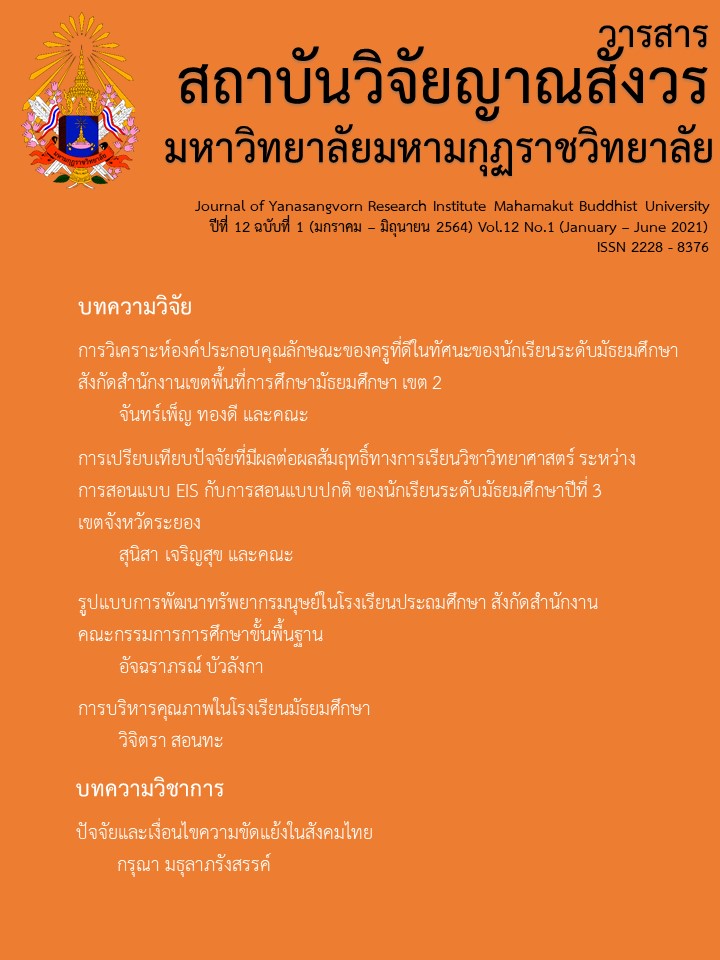A CONSTRUCTION OF BASIC SKILLS TEST IN SCIENCE PROBLEM SOLVING FOR PRATHOMSUKSA 6 UNDER PRIMARY EDUCATION SERVICE AREA OFFICE 2
Main Article Content
Abstract
This research aimed to 1) construct a basic skills test in science problem solving 2) verify concurrent validity and 3) construct a cutting score for determining the test score in order to improve learning management. The sample of 664 subjects were obtained by using stratified random sampling technique. Data was analyzed by using descriptive statistics. Findings were as follow : 1. The reliability of basic skills test in science problem solving was .86, the difficulty was between .35-.95 and the discrimination was between .07-.58. 2. The concurrent validity verified by using correlation between the score of basic skills test and the score of science test. The correlation coefficient was .52 which was statistically significant at α .05. 3. The cutting score was designed to be the criteria for determining the test score and considered in 3 levels; 3.1 The cutting score of the entire test score was at 50% and over. 3.2 The cutting score of each skill in the test were 80%, 75%, 70%, 65%, 60%, 55%, 50% and over for the observing skill, measurement skill, classifying skill, using numbers skill, organizing data and communicating skill, experimenting skill and constructing model skill, respectively. 3.3 The cutting score of individual score was the same as each skill score.
Article Details
References
กระทรวงศึกษาธิการ. (2560). แผนการศึกษาแห่งชาติ พ.ศ. 2560-2575. กรุงเทพฯ: บริษัทพริกหวานกราฟฟิค จำกัด.
พัชรี โคแสงรักษา. (2558). การพัฒนาทักษะกระบวนการทางวิทยาศาสตร์ และผลสัมฤทธิ์ทางการเรียนวิทยาศาสตร์สำหรับนักเรียนชั้นประถมศึกษาปีที่ 2 โดยใช้การจัดกิจกรรมการเรียนรู้ด้วยชุดกิจกรรม. วิทยานิพนธ์ครุศาสตรมหาบัณฑิต มหาวิทยาลัยราชภัฏมหาสารคาม มหาสารคาม.
สถาบันทดสอบทางการศึกษาแห่งชาติ. (2562). สรุปผลการทดสอบทางการศึกษาระดับชาติขั้นพื้นฐาน (O-NET). สืบค้นเมื่อวันที่ 7 เมษายน 2563, จาก https://www.niets.or.th/th/catalog/view/3865.
สุวิมล ติรกานันท์. (2550). การสร้างเครื่องมือวัดตัวแปรในการวิจัยทางสังคมศาสตร์ : แนวทางสู่การปฏิบัติ (พิมพ์ครั้งที่ 1). กรุงเทพฯ: โรงพิมพ์แห่งจุฬาลงกรณ์มหาวิทยาลัย.
สุวิมล ติรกานันท์. (2553). การวิเคราะห์ตัวแปรพหุในงานวิจัยทางสังคมศาสตร์ (พิมพ์ครั้งที่ 2). กรุงเทพฯ: โรงพิมพ์แห่งจุฬาลงกรณ์มหาวิทยาลัย.
สำนักงานเขตพื้นที่การศึกษาประถมศึกษาสมุทรปราการ เขต 2. (2562). รายงานผลการประเมินผลสัมฤทธิ์ทางการเรียนวิชาวิทยาศาสตร์ ชั้นประถมศึกษาปีที่ 6. สืบค้นเมื่อ 10 เมษายน 2563, จาก http://www.spn2.go.th/samutprakan2.
Darmaji, D., Kurniawan, A. D., & Irdianti, I. (2019). Physics education students’ science process skills. International Journal of Evaluation and Research in Education, 8(2), 293-298.


